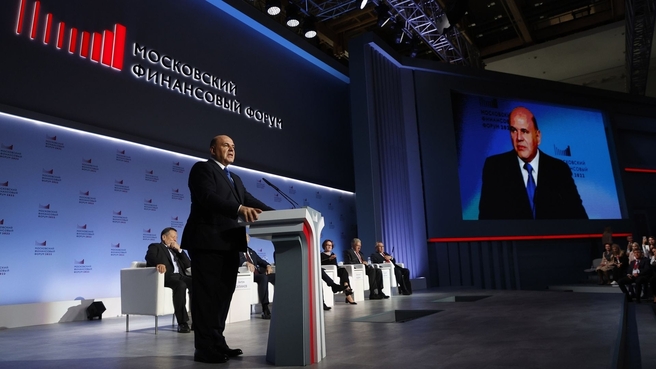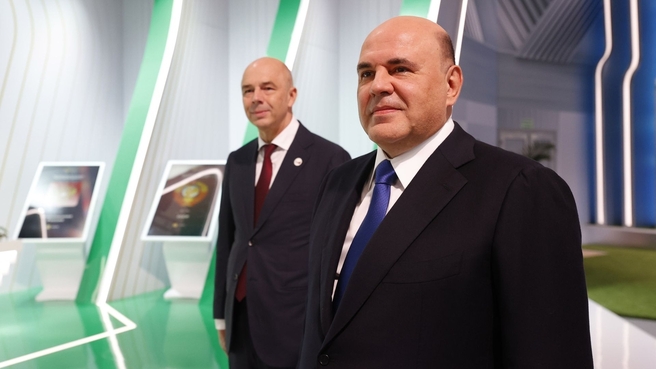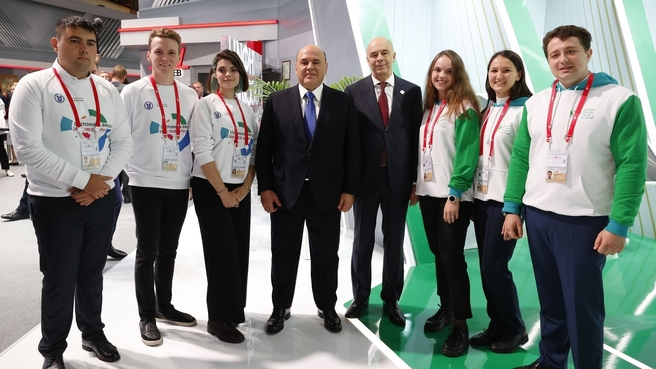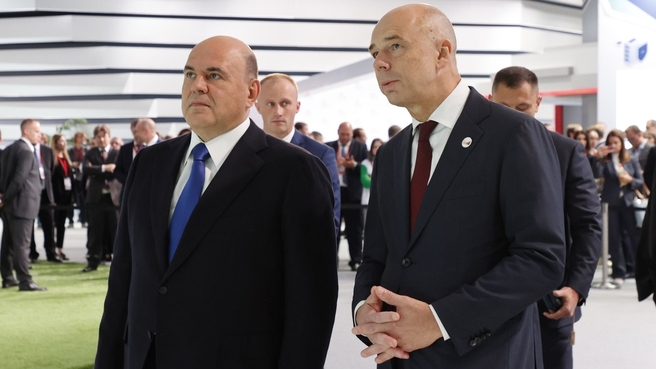The Prime Minister spoke at the forum’s plenary session, Financial Sovereignty of Russia: Myth or Reality.
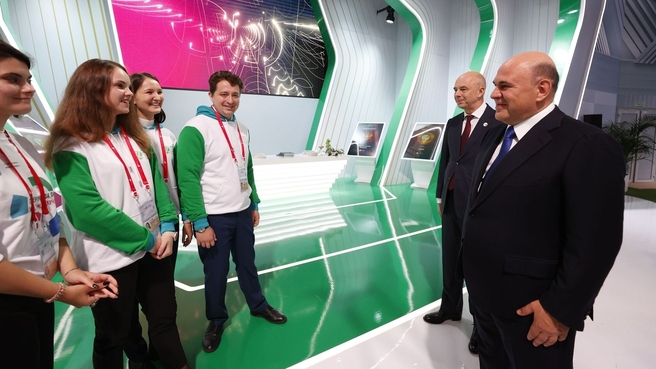
Mikhail Mishustin attended the Moscow Financial Forum. With Finance Minister Anton Siluanov and university students – winners of financial contests and representatives of the youth resources of the Finance Ministry
Mikhail Mishustin’s remarks at the Moscow Financial Forum
The key topic of the forum in 2022 is Russia’s Financial Sovereignty: Myth or Reality. The forum participants will be able to discuss the impact of global geopolitical changes on the Russian and world economy, as well as new challenges that have arisen over the past year.
Topical matters that will be discussed include the prospects of the Russian economy and financial markets under external restrictions, the transformation of the country’s debt policy and the tax policy of modern times, as well as the regulation of cryptocurrencies in Russia.
As per tradition, participants in the forum will include federal and regional officials, businesspeople, representatives of public organisations and associations, as well as experts on economics and finance.
The first Moscow Financial
Forum took place on 23 September 2016 and established the tradition of
financiers meeting each September to discuss the most pressing problems and
develop effective solutions.
Mikhail Mishustin’s remarks:
Ladies and gentlemen,
I am glad to welcome you all to the Moscow Financial Forum. Traditionally, it takes place at the beginning of the autumn. This year it is also an anniversary. On this day 220 years ago, Emperor Alexander I established the Ministry of Finance, a ministry that united disparate collegiums dealing with revenue and expenditure, and with what is called administration in the modern language.
So today, the Ministry of Finance has brought together a wide range of professionals on this platform to discuss priorities in this important area, which is especially relevant at a time of major change and system-wide challenges.
The main theme of the forum is Russia’s financial sovereignty.
Unprecedented sanctions have been imposed on our country, but their initiators have not achieved their main goal. They did not succeed in undermining our financial stability.
First and foremost, this was due to the prompt decisions taken by our President. The Government together with the Bank of Russia managed to significantly mitigate the negative impact of unfriendly actions against our citizens and businesses. The fact that representatives from the regions and our business community, experts and public associations took part in preparing a number of measures had a positive effect. This made it possible to take into account the specific features of particular industries and areas as fully as possible.
Measures have been taken to curb capital outflow and ensure the smooth operation of banks and other relevant organisations. The rouble exchange rate was strengthened.
The attempt to limit energy exports led to a natural increase in our budget’s oil and gas revenues – almost by half.
A plan of priority actions to ensure the development of the Russian economy under external sanctions pressure was prepared in a timely manner and was constantly augmented. It included more than 300 measures. A significant part of them is, in one way or another, related to issues of financing.
Of course, the foundation that Russia created in previous years, in the 2000s, in the 2010s and during the fight against COVID, also played a positive role. I am referring to the accumulated money reserve, an operational financial infrastructure for making all payments within the country – both for businesses and for individuals. We provided support for our citizens, and they supported domestic demand.
All those measures neutralised any attempt to disrupt the operations of enterprises. They continue to work, gradually reorganising their logistics and commodity chains. Projects are being implemented, people have kept their jobs and their wages.
These efforts have borne fruit. The economy is gradually adapting to the new realities. Although a certain slowdown was to be expected, it was not fatal, as the initiators of the sanctions had assumed.
According to the Ministry of Economic Development, in January-July, Russia’s gross domestic product shrank by a little over 1 percent compared to the same period in 2021. But in that period, our economy was growing at a faster pace, recovering from COVID. For comparison: during the global crisis of 2009, GDP fell by seven times as much, while we had no external restrictions at the time.
Our industrial production, agriculture, and construction indicators remain positive.
According to estimates, consumer demand is already past its lowest point. By the way, July was the third month that unemployment was at a historic low, 3.9 percent of the labour force.
Contrary to initial fears, investment has grown. In the second quarter of this year, fixed capital investment across the board grew by 4 percent in real terms. Moreover, the largest contribution was made by the manufacturing industries, primarily export-oriented industries.
Businesses reacted differently than the initiators of the sanctions had intended. Basically, business leaders sought to continue investment programmes where possible rather than scrap them.
We had been warned of a deep recession, but this did not happen. We have been robustly responding to emerging challenges and, obviously, we will emerge from the current situation even stronger and better prepared.
As the economy adapts to modern conditions, some capital controls are gradually being relaxed. First, this concerns the stabilisation of residents’ foreign exchange operations. We are lowering barriers for participants in foreign economic activity, as they are working to rearrange their supply chains, reconfigure their imports, and find new markets for their products.
Now Russia is in the process of rethinking its financial sovereignty. We need to create an architecture that will meet our current objectives while remaining resilient to third country influence.
The President has determined the long-term priorities for the nation’s development. He identified five national development goals, which you are well aware of, as well as the instruments for achieving them – the national projects, government programmes and strategic initiatives.
The most important job for the government members responsible for financial and economic matters is to ensure the funding required to reach the targeted indicators and fulfil all social obligations to the people through the proper planning of revenues and expenditures.
We are fully aware that we will have to operate for a long time under sanctions pressure, which will possibly be growing stronger.
We recently held a strategic session on the further development of the domestic financial system. We adopted a number of fundamental decisions, including on further adjustments, and on building new effective mechanisms for saturating our economy with sufficient liquidity, ensuring industries’ sustainability and saving jobs.
It is important to finalise, with due account of the current challenges, and adopt the Strategy for the Development of the Financial Market until 2030. Its consistent implementation, together with the Bank of Russia, will help us increase the inflow of additional investment in Russia’s economic development.
We need to specifically focus on innovation and promote digital financial assets.
We need the financial sector to go digital expeditiously. The world is moving quickly towards a cloud-based infrastructure. This is the most important element of being competitive. What used to take weeks and months, now happens in a couple of clicks or touches on a smartphone screen. But at the same time, it is our duty to maintain independence from the regulators in the countries where the servers are located. And of course, we also need to ensure the cybersecurity of our system.
Another component of financial sovereignty is the transition to the wider use of national currencies. The de-dollarisation process actually began much earlier, but the sanctions, if anything, have strengthened our interest in this. The Moscow Exchange currently offers trading in seven pairs including friendly countries’ currencies. While in January-February 2022, the average daily volume of spot transactions in such currencies was 1.7 billion roubles, in July-August, it was already as high as 60 billion. The share of payments in national currencies is also expanding on the territory of the Eurasian Economic Union.
Reducing the use of the dollar is a long-term trend; it requires a long and consistent effort. If other countries join this drive, a multipolar system for international transactions can be established.
It is also essential to simplify foreign investors and issuers’ access to the Russian market.
However, these plans do not mean that Russia should close itself off from the world. Moreover, sovereignty is not about isolation; it is about security and stability. The transformation of current financial and economic processes – the restructuring of trade chains, the revision of approaches to reserve currencies, the fragmentation of payment systems – does not rule out the profound change happening in the world or its structure.
The Russian Government and the Bank of Russia will adjust the financial system inside the country, to make sure it meets the needs of individuals and businesses under any circumstances, especially when political decisions override economic ones in the world.
Friends,
I have touched on just a few areas that require our close attention in the near future. The plans and priorities we have outlined are quite challenging. Moreover, no other country in the world has ever accomplished such plans under the unprecedented sanctions pressure we are seeing.
I am sure that many ideas and proposals will be put forward at the forum today. My colleagues in the Government and I will carefully study them. And the most interesting and relevant ones will definitely be included in our plans.
Taking this opportunity, I would like to wish all the best to Finance Minister Anton Siluanov, and the Ministry of Finance staff and the veteran workers on the ministry’s anniversary. And to all those present – happy Financier’s Day, your professional holiday. Thank you for all your dedicated work, for your efforts to effectively develop your projects. Ultimately, your efforts have a positive impact not only on your businesses’ operations, but also on our economic dynamics as a whole.
I wish you productive work.
Thank you for your attention.
